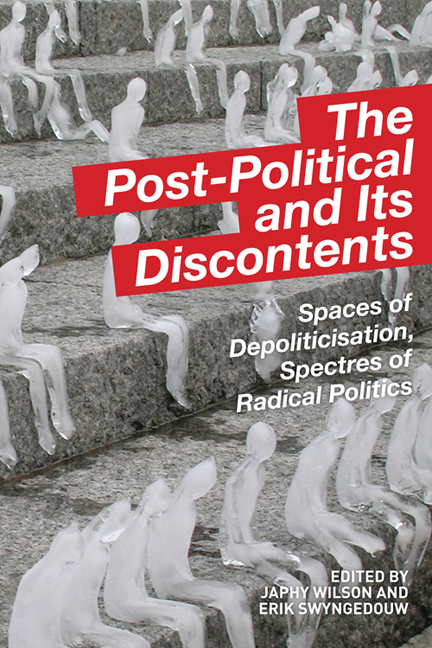Book contents
- Frontmatter
- Contents
- List of Contributors
- Seeds of Dystopia: Post-Politics and the Return of the Political
- Part I Spaces of Depoliticisation
- 1 The Post-Politics of Sustainability Planning: Privatisation and the Demise of Democratic Government
- 2 The Post-Political and the End of Nature: The Genetically Modified Organism
- 3 The New Development Architecture and the Post- Political in the Global South
- 4 Opening Up the Post-Political Condition: Multiculturalism and the Matrix of Depoliticisation
- 5 The Jouissance of Philanthrocapitalism: Enjoyment as a Post-Political Factor
- 6 Religious Antinomies of Post-Politics
- 7 Post-Ecologist Governmentality: Post-Democracy, Post- Politics and the Politics of Unsustainability
- Part II Spectres of Radical Politics
- There Is No Alternative
- Index
4 - Opening Up the Post-Political Condition: Multiculturalism and the Matrix of Depoliticisation
from Part I - Spaces of Depoliticisation
Published online by Cambridge University Press: 05 August 2016
- Frontmatter
- Contents
- List of Contributors
- Seeds of Dystopia: Post-Politics and the Return of the Political
- Part I Spaces of Depoliticisation
- 1 The Post-Politics of Sustainability Planning: Privatisation and the Demise of Democratic Government
- 2 The Post-Political and the End of Nature: The Genetically Modified Organism
- 3 The New Development Architecture and the Post- Political in the Global South
- 4 Opening Up the Post-Political Condition: Multiculturalism and the Matrix of Depoliticisation
- 5 The Jouissance of Philanthrocapitalism: Enjoyment as a Post-Political Factor
- 6 Religious Antinomies of Post-Politics
- 7 Post-Ecologist Governmentality: Post-Democracy, Post- Politics and the Politics of Unsustainability
- Part II Spectres of Radical Politics
- There Is No Alternative
- Index
Summary
In recent years a broad scholarly consensus has acknowledged farreaching alterations in Western political systems (Crouch 2004). From the advent of stakeholder democracy, consensus building and good governance to the rise of populism at both the Left and Right ends of the political spectrum, all of these developments are said to announce a rupture in the workings of national liberal-democratic regimes. While eminent sociologist Ulrich Beck (1997) identified the changes as a ‘reinvention of politics’ in a (necessary) process of ‘reflexive modernization’, a heterogeneous collection of scholars has recently developed a more critical account. Instead of tackling the democratic deficits associated with representative government or politically accommodating a plurality of lifestyles, the institutional and discursive innovations of ‘governance-beyond-the-state’ (Swyngedouw 2005) are now increasingly portrayed as symptoms of the strengthening of disciplinary control over the life of citizens and even of deepening authoritarianism.
These critical reflections on the proliferation of new political forms have been increasingly addressed from the perspective of the distinction between politics and the political (Dikec 2005; Swyngedouw 2011). Politics refers to the practices that institute society and create social order. For social order to arise, politics necessarily implies the instauration of social differentiation, which establishes societal hierarchies between class, race, gender or any other imaginable classification. However, a crucial insight of post-foundational political thought, as this critical approach is sometimes called (Marchart 2007), is the impossibility of any social order to sustain itself in the same form indefinitely. Since there is no ultimate ground for society and the hierarchical differences on which it rests, any social order is open to disruption by those who happen to be excluded and marginalised by it. According to Marchart (2007), it is in this moment of disruption that the ‘political difference’ between the society-as-instituted on the one hand and its absent ultimate ground on the other comes to the fore as the inevitable political condition of society.
By putting this political difference centre-stage in their analysis, scholars aim to criticise much celebrated new political forms and practices such as ‘good governance’, ‘consensus building’ and ‘stakeholder democracy’. Erik Swyngedouw (2007; 2008; 2009) has labelled these ‘post-political’ to indicate that they paper over the inequalities which run through society, disavowing the rifts in society, and foreclosing potential struggles for alternative political futures.
- Type
- Chapter
- Information
- The Post-Political and Its DiscontentsSpaces of Depoliticisation, Spectres of Radical Politics, pp. 86 - 108Publisher: Edinburgh University PressPrint publication year: 2014



